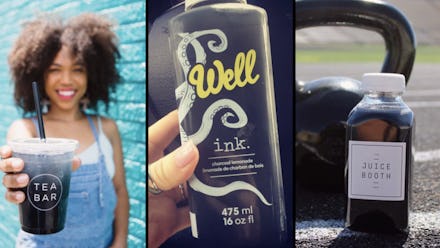Here's what to know about the health benefits of activated charcoal

Keeping up with health food trends can be awfully pricey. A daily green juice will burn a hell of a hole in your wallet. Want to grab an acai bowl for a quick snack? Fork over $10, please and thanks. Activated charcoal beverages are no exception: Six bottles of Dirty Lemon detox drinks will cost you $65, meaning each 16-ounce bottle costs close to $11.
Expensive drinks infused with activated charcoal have been popular for over two years now, ever since celebs like Gwyneth Paltrow and Shailene Woodley professed their love for charcoal, Racked reported in 2014. And unlike some health trends that are a flash in the pan (ahem, oil pulling, anyone?), the fixation on activated charcoal is still as strong as ever. In fact, there have been more searches for activated charcoal than searches for green juice, according to Google Trends.
Even Chrissy Teigen is into charcoal — or, uh, thinking about getting into charcoal.
Wondering if you should swap your morning coffee for a different black-hued beverage? Here's what you need to know about activated charcoal.
What is activated charcoal?
Burning items like wood or fruit shells produces charcoal, Racked noted. Many companies like Dirty Lemon use charcoal made from coconut shells. (The black hue behind the viral black ice cream from last summer was also thanks to coconut shells.)
Charcoal becomes "activated" through a process that increases the surface area of the charcoal.
"Activated" charcoal is notably different from the ashy stuff that collects in your fireplace. It's a "special form of carbon" that can adhere to other substances, National Capital Poison Control noted, explaining that charcoal becomes "activated" through a process that increases the surface area of the charcoal. "One teaspoonful of activated charcoal has about the same total surface area as a football field," National Capital Poison Control noted. (Talk about large and in charge!) Charcoal is frequently used in emergency rooms to help humans and pets that overdose on harmful, toxic products.
Activated charcoal's ability to help the body rid itself of potentially harmful toxins made it a go-to ingredient in Ancient Egypt. Native Americans used to use powdered charcoal to treat upset stomachs, too.
Activated charcoal's alleged health benefits
There's 0.25 g (250 mg) of activated charcoal in each serving of Dirty Lemon detox water, a drink the brand's site claims can "calm the stomach" and "trap impurities" before they're absorbed in the body. In comparison, Optimum Charcoal Capsules, over-the-counter medication commonly used to relieve bloating and gas, contains 200 mg of charcoal.
"Activated charcoal acts like a magnet by binding to heavy metals and contaminants, making it a powerful ingredient in a detox regimen," Sommer Carroll, Dirty Lemon's co-founder, said in an email.
"The major health benefit of activated charcoal is its ability to absorb and remove bacteria in the digestive system." —Marcus Antebi, Juice Press founder
The Green Charcoal drink at Juice Press, a chain that sells organic juices and other health foods, is a blend of charcoal, cucumber, celery, lemon and kale, Marcus Antebi, Founder of Juice Press, said in an email, explaining the company is also going to release a new drink that has activated charcoal mixed with water, lemon, maple and cayenne. The Green Charcoal drink has 0.2 g of charcoal, and a new Juice Press drink called "Dirty Detox" has 0.35 g of charcoal.
"The major health benefit of activated charcoal is its ability to absorb and remove bacteria in the digestive system (when used correctly)," Antebi said. "Activated charcoal should not be overused, as it can absorb friendly bacteria (think probiotics) that are essential to maintaining a healthy body."
Should you drink activated charcoal?
As Antebi pointed out, one downside to activated charcoal is that it can strip your body of probiotics. It can also interact with medications. It can "block the absorption of other drugs," and the FDA says it is not safe for pregnant women to consume.
"Charcoal doesn't discriminate between 'good' or 'bad' nutrients, it binds to anything in your stomach." —Alissa Rumsey, registered dietitian
"We're still waiting for conclusive evidence on the effect of supplemental activated charcoal," Caroline Passerrello, registered dietitian and spokesperson for the Academy of Nutrition and Dietetics, said in an email, noting that small studies found charcoal helped relieve gas.
Juice Press' Antebi believes there's value in activated charcoal even if the science is lagging behind the wellness world hype.
"When it comes to nutrition, digestion and overall human chemistry, it's common to find ingredients or products that lack what many would consider 'sufficient scientific backing,'" he noted. "There is something to be said about the many consumers that have seen and felt the health benefits of activated charcoal on their bodies."
But others say ingesting charcoal may be pointless.
"There is conflicting evidence that activated charcoal helps with gas, with some studies showing positive benefit and others showing no difference," Alissa Rumsey, registered dietitian and spokesperson for the Academy of Nutrition and Dietetics, said in an email. "Charcoal doesn't discriminate between 'good' or 'bad' nutrients, it binds to anything in your stomach. This means you could end up absorbing fewer vitamins and minerals."
Translation: Your expensive, charcoal-infused concoction might just negate other healthy decisions you make. Bummer... for your body and your wallet.
Correction: April 17, 2017